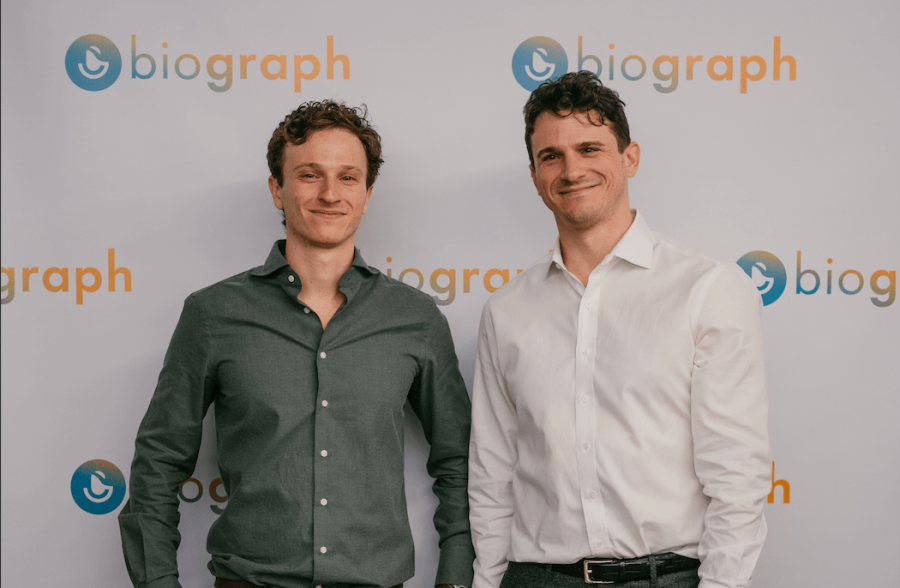NU Alum Aaron Greenberg founds accessible storytelling app Biograph
Photo courtesy of Aaron Greenberg
Co-founders of Biograph, AJ (left) and Aaron (right) Greenberg. The brothers created the app as a way to make authentic storytelling accessible to everyone. Users of the app are able to create and preserve memories in real time, documenting their life for friends and family.
January 10, 2023
Aaron Greenberg has always loved storytelling. After receiving a Ph.D. in literature from Northwestern in 2017, Greenberg went on to create robust biographies through his company Biograph, which he founded in 2018 with his brother AJ.
The Biograph app, released in December, is designed for people to tell their stories in real time and preserve memories to share with friends and family. Users can upload photos, text and voice recordings periodically and, unlike social media, the stories are private, which Greenberg says creates the opportunity for vulnerability.
Biograph’s application aims to make authentic storytelling accessible to all. Well-researched biographies can cost upwards of $100,000, an inhibiting factor for individuals who want their story told, according to Greenberg.
The company has worked on both commissioned biographies and pro bono work to elevate the voices of people of color and the Chicago community. An ongoing project called “On the Corner” explores the stories of Chicago residents of many different backgrounds.
“Any life story is not (just) the grand historical events and the profound philosophical meditations but the spontaneous and authentic observations of everyday life,” Greenberg said. “We made this (as a) celebration of the everyday.”
According to former Biograph freelancer Alexander McNab, the company started out telling the stories of the Chicago Jewish community and branched out to sources like Darlena Williams-Burnett, a Black woman who grew up in the South.
McNab said that while people of color have always found ways to tell their stories with dignity, the app will let diverse voices be heard by a larger audience.
Williams-Burnett, who used Biograph to tell her son her life story, was the first in her family to attend college and ended up in public office, elected as the State Central Committeewoman of the 7th Congressional District last March.
“Being a Black person, I come from a legacy of oral storytellers, which means you don’t have to write (things) down for it to be there,” McNab said. “I think the benefit of (apps) like this and other story telling technologies is that it allows for those voices to be heard by more people.”
Former Biograph advisor Jonathan Eig said he treasures the letters saved from his grandparents and wishes he had more, as Biograph could offer.
Eig called Biograph a powerful mode of storytelling.
“I think we understand the world through stories, we understand ourselves through stories and ultimately, we all want our stories to be remembered,” Eig said. “We want to leave something behind that allows people to remember us.”
Aaron Greenberg said anecdotally, the users have been diverse in terms of age, gender and race, which he attributes to the elimination of the price barrier.
NU Ph.D. candidate in Art History Alissa Schapiro described Biograph as social media with a heart and soul.
One of the first to test a beta version of the app, Schapiro appreciated how she could preserve an intimate dinner on a card, an additional paid service the app offers. The card, which came with a photo and audio transcription, has since become a treasured keepsake.
“The three of us memorialized a moment of friendship in a way that felt collaborative and honest,” Schapiro said.
Poet, author and English professor at Beloit College Toby Altman, a graduate classmate of Greenberg, said Biograph democratizes writing and gives writing tools to people who might not have had access otherwise.
Co-founder AJ Greenberg said they already received feedback from people who are glad they saved memories, ranging from the excitement of a night out to hearing the voice of a loved one they have lost.
The app seeks to preserve human connection, Greenberg said. Schapiro said that this type of connection can help bring people together.
Schapiro added that stories help us understand each other and to share our own narratives. When society is fractured, she said, stories have the power to break down boundaries of experience, time and space.
Greenberg said the app tries to find a better way for people to create and access their own memories.
“The goal (of the app) is to reinvent the way that people record their memories and create memories,” AJ Greenberg said. “And connect in a much more meaningful way with themselves and with their friends and their families.”
Email: jonathanaustin2023@u.northwestern.edu
Twitter: @JackAustinNews
Related Stories:
— Q&A: NU alum and Springrose founder Nicole Cuervo talks inspiration, bras
— Q&A: NU alum Danny Ginzburg discusses plant research, Gates Cambridge Scholarship


